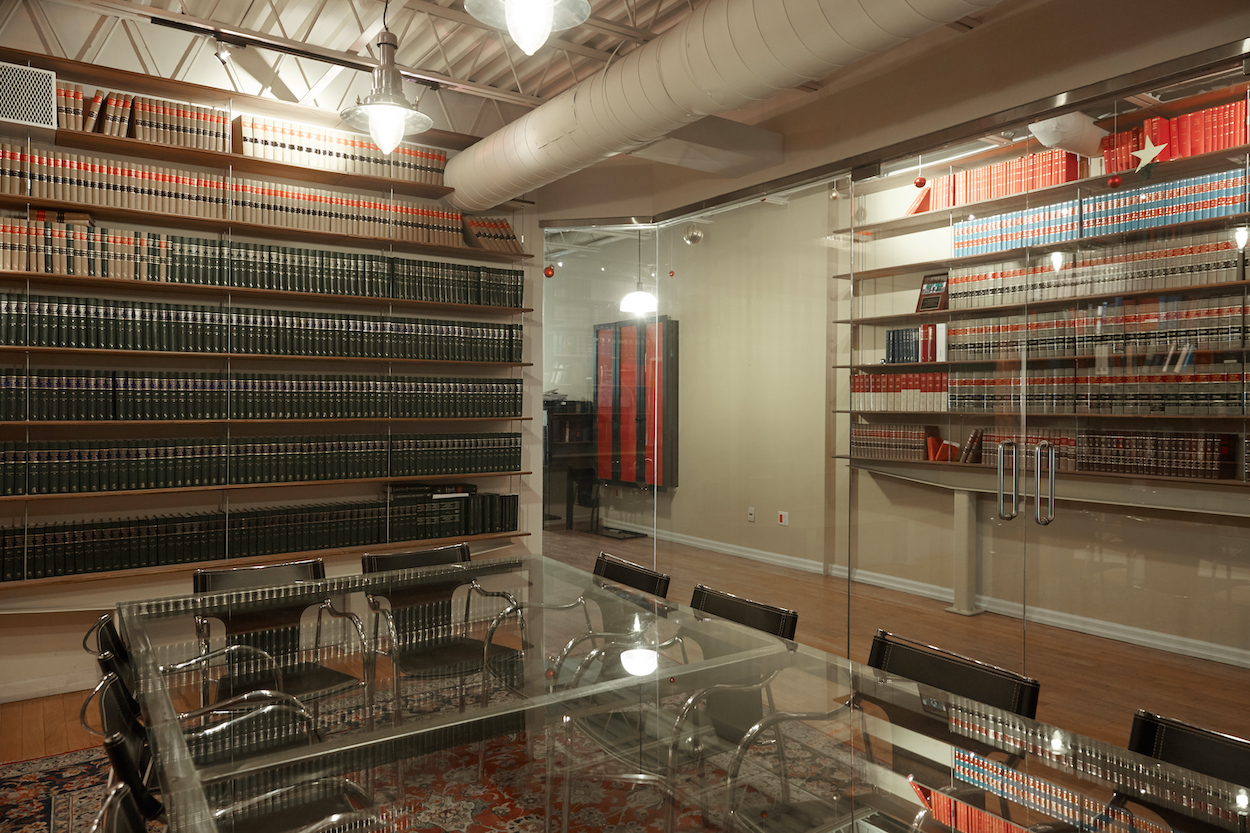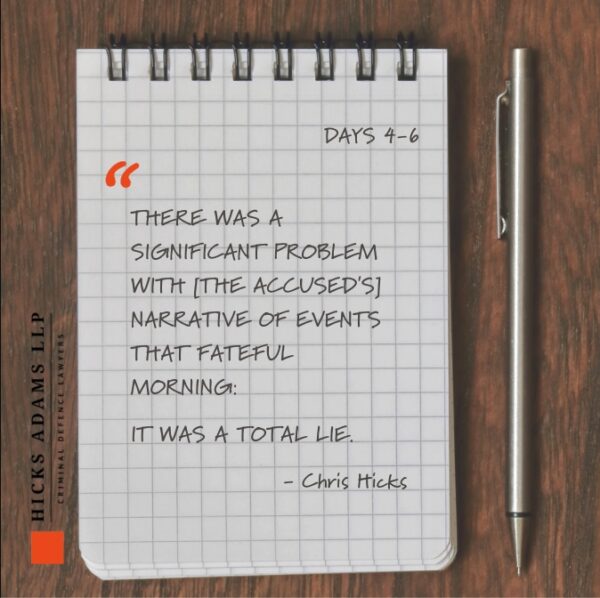Criminal defence lawyer and partner at Hicks Adams LLP Christopher Hicks has written a series of journal entries to take readers behind the scenes of something few people have exposure to: a trial for first-degree murder. In these journals, readers will experience the daily progress of a trial from the defence lawyer’s point of view, with the lawyer’s perspective on everything including witness testimony, judicial rulings and legal strategy.
Making this series especially unique is the fact that this is the first jury trial to go forward in Ontario after the start of the Covid-19 pandemic. With new safety protocols in place, everything is different from the placement of the jury, the lack of observers in the public gallery and even the freedom of movement for the lawyers.
DAY 4
Cynthia Taylor continued to testify about the relationship between Robert McGregor and Joanne MacKenzie. The introduction of unprecedented court proceedings over custody of their daughter rendered the relationship chillier than it had previously been. Further, Joanne MacKenzie now had a male friend, Drew Jessup, rumoured to be a drug dealer. On Canada Day weekend 2011, Joanne MacKenzie left her mother’s home to spend the weekend with Jessup, her new boyfriend. It was the last time Cynthia Taylor saw her daughter alive.
When Taylor couldn’t contact her daughter the evening of July 2, she reported her missing, and the Peterborough police began an investigation.
DAY 5
Drew Jessup testified. He was not a drug dealer but occasionally did favours for friends. On Canada Day he and Joanne MacKenzie went to a firework display and partied with friends, later going to his apartment to spend the night.
Early the next morning he was awakened by a phone ringing. Joanne MacKenzie was talking to Robbie McGregor, who was relating a concern about their daughter. Robbie McGregor said he believed their daughter had been sexually molested, and that the leading candidate for this abuse was Jessup.
At trial, this allegation was forcefully denied by Jessup under cross-examination, and quite convincingly, and it was in firm contrast to Robbie McGregor’s narration of events..
Joanne MacKenzie left Jessup’s apartment to meet Robbie McGregor and deal with the issues concerning their daughter. It was the last time Jessup saw Joanne MacKenzie alive.
DAY 6
Shilo Caruso was a friend of Joanne MacKenzie who detested Robbie McGregor but was not allowed to tell the jury why, to prevent the jury from hearing evidence of bad character.
Caruso said that MacKenzie had dyed her red hair dark because she feared she was being followed. On her Facebook page, MacKenzie posted that she was no longer seeing Jessup, but she told Caruso that wasn’t true. Caruso expected Joanne MacKenzie and her daughter to visit and stay with her in Toronto after the Canada Day weekend, but they never appeared.
Joseph Hanlon was Joanne MacKenzie’s younger brother. They were close, and he had witnessed the relationship between MacKenzie and McGregor. During both their union and separation, relations were cordial and the two had gotten along.
Hanlon said that Jessup only came to the family home once when Joanne MacKenzie’s daughter was present, and the two were never alone. This was important testimony, as it undermined Robbie McGregor’s proposition that Jessup had opportunity and access to the young girl, and was the leading candidate for any molestation.
Equally important was Hanlon’s evidence that Joanne MacKenzie habitually carried a knife in her purse, one that ‘switched out’. She was comfortable with this knife and handled it adroitly, he said. This testimony assisted Robbie McGregor’s version of the events of July 2.
Hanlon had partied with Joanne MacKenzie and Drew Jessup at a local park on Canada Day. He had taken an angry call from Robbie McGregor, but he couldn’t recall the content. MacKenzie and Jessup left the park together heading for Jessup’s place.
On July 2, when Joanne MacKenzie couldn’t be contacted, Hanlon and his mother Cynthia, who knew from Jessup that Joanne MacKenzie had left his apartment earlier to meet Robbie McGregor, drove to Robbie McGregor’s farm.
Joanne and Robbie’s daughter was in Robbie’s custody for the Canada Day weekend. Cynthia and her son thought MacKenzie might be there because she had left to meet Robbie earlier that day.
At the farm, Robbie McGregor gave Hanlon a narrative of events that he would embrace until he testified at trial: Robbie and Joanne had agreed to meet in the Tim Horton’s parking lot the morning of July 2 over his concern that their daughter had been sexually abused. However, Joanne had never showed. While waiting for Joanne, Robbie had been jumped by 5 or 6 guys, after which he simply went back home.
There was a significant problem with Robbie McGregor’s narrative of events that fateful morning:
It was a total lie.
The second problem was that he told the same lie over and over – to family, friends, police, and the world at large.
The third problem with Robbie McGregor’s tale of events the morning of July 2 was highly significant: There was a security video.
The video of the Tim Horton’s parking lot not only showed Joanne MacKenzie arriving at the meeting place, but also getting into Robbie McGregor’s truck, and the truck driving off.
Robbie McGregor had not been beaten by random strangers.
Joanne had not failed to show up.
Investigators had the video on July 4, putting the lie to Robbie McGregor’s narrative of events of the morning of July 2.
Stay tuned for future installments in this series, which will be posted every Monday.
Christopher Hicks is one of the founding partners of the criminal law firm of Hicks Adams. He has been practicing criminal law for more than two and a half decades, with a special interest, and extensive experience, in jury trials and appeals. In the course of his career, Christopher has been involved in scores of jury trials involving the most serious crimes in the criminal code, has argued appeals of both conviction and sentence in the court of appeal on a regular basis, and has represented clients in the Supreme Court of Canada on more than a half dozen occasions.
To reach Christopher or any of the experienced and dedicated criminal lawyers at Hicks Adams, contact the firm at 416-975-1700 or online to discuss your matter in confidence.



